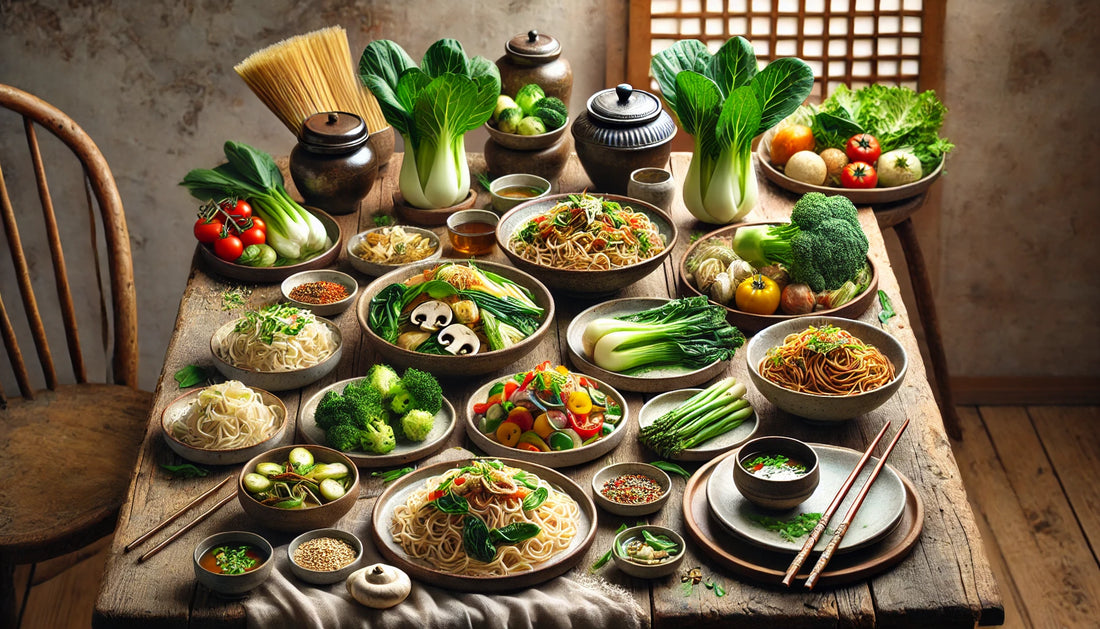South Korea consistently ranks as one of the healthiest countries globally, with its traditional diet being a key contributor to this achievement. Korean cuisine is celebrated for its balanced, nutrient-rich meals that are naturally low in unhealthy fats and sugars.
In this blog, we’ll explore how the dietary habits of Korea contribute to its health statistics, with a closer look at one iconic dish, Jajangmyeon, and other factors that make Korean meals both nutritious and satisfying.
For more on Jajangmyeon, dive into The Ultimate Guide to Jajangmyeon or our in-depth look, Exploring the World of Jajangmyeon: A Plant-Based Take on Korea's Beloved Noodle Dish.
The Role of Diet in Korea’s Health Rankings
Why Is Korea Consistently Ranked as a Healthy Country?
Korea’s dietary approach places strong emphasis on vegetables, whole grains, and fermented foods, known for their numerous health benefits. A diet rich in plant-based foods and low in processed sugars is associated with reduced risks of chronic illnesses like heart disease and diabetes.
A Balanced Approach to Nutrition
Korean cuisine promotes balance in every meal. Typically, a meal includes:
- Whole Grains: Staples like rice or noodles, providing energy and fibre.
- Protein Sources: Often plant-based, like tofu, alongside seafood or lean meats.
- Vegetables: An array of colourful vegetables, offering a wealth of vitamins and minerals.
- Fermented Foods: Kimchi and other fermented sides provide probiotics that support gut health.
Each component contributes to a balanced intake of macronutrients, helping sustain energy and preventing overreliance on high-calorie foods.
Jajangmyeon: A Plant-Based Twist on a Korean Favourite
What Is Jajangmyeon?
Jajangmyeon, a Chinese-inspired noodle dish, has become a Korean comfort food staple. Traditionally prepared with rich black bean paste, it’s paired with fresh vegetables and often a protein like pork. Our plant-based Jajangmyeon substitutes meat with tofu and mushrooms, preserving its deep flavour while adding a nutritious, vegan-friendly twist.
Health Benefits of Jajangmyeon
Jajangmyeon offers more than just flavour; it’s also packed with nutrients:
- Black Bean Paste: Rich in antioxidants, it supports heart health and helps reduce inflammation.
- Tofu: Provides plant-based protein and essential amino acids.
- Vegetables: Full of fibre, vitamins, and minerals, contributing to digestion and overall wellbeing.
For an in-depth exploration of this dish, check out our blog Exploring the World of Jajangmyeon.
Key Ingredients That Contribute to Wellness
Essential Ingredients in Korean Cuisine
Korean dishes like Jajangmyeon use fresh, nutrient-dense ingredients with many health benefits.
- Black Beans: High in fibre and antioxidants, they support heart health and reduce oxidative stress.
- Kimchi: This fermented cabbage or radish side dish is a probiotic powerhouse that enhances gut health and boosts immunity.
- Seaweed: Common in soups and snacks, seaweed is a source of iodine for thyroid health and hormone balance.
These ingredients are integral to Korean cuisine, adding to its reputation as a nutritious, health-promoting diet.
Korean Cuisine’s Impact on Longevity and Wellbeing
The Benefits of Fermented Foods
Fermented foods are a Korean dietary staple, bringing unique health benefits. Studies link regular consumption of probiotics like kimchi to improved digestion, immunity, and reduced inflammation. .
Korean Portion Sizes and Variety Support Healthy Eating
In Korean dining, meals typically feature several small side dishes, or "banchan." This approach promotes mindful eating and satisfies a variety of tastes, reducing the likelihood of overeating.
Emulating Healthy Korean Eating Habits
Incorporating Korean Dishes into Your Weekly Meal Plan
Introducing Korean-inspired meals to your diet can be a rewarding, nutritious experience. Try starting with a plant-based version of Jajangmyeon or other popular dishes for a taste of Korean cuisine that’s both flavourful and healthful.
Benefits of Vegan Korean Cuisine
For those following a vegan lifestyle, Korean dishes like plant-based Jajangmyeon offer balanced nutrition and incredible taste. Discover more about the versatility of vegan Korean dishes in our blogs on Asian-Inspired Meals.
Frequently Asked Questions (FAQs)
1. Is Korean food generally healthy?
Yes, Korean food is balanced and nutrient-rich, with a focus on fresh vegetables, whole grains, and fermented foods that support heart health, digestion, and immunity.
2. Can I find plant-based Korean meals?
Absolutely! Korean cuisine offers plenty of plant-based options. Our plant-based Jajangmyeon is a delicious example.
3. What is the main benefit of fermented foods in Korean cuisine?
Fermented foods like kimchi provide probiotics, which enhance gut health and support immunity while offering antioxidants and anti-inflammatory properties.
Embrace Korean Cuisine for a Healthier Lifestyle
Korean cuisine, with its foundation in fresh vegetables, plant-based proteins, and probiotic-rich fermented foods, offers a balanced nutritional approach that supports longevity and health. By embracing dishes like Jajangmyeon, you can experience a delicious and healthful diet that aligns with wellness and sustainability.
For more on incorporating Korean flavours, check out our collection of plant-based Asian meals or explore our blogs on Korean and Asian-inspired cuisine.
Whether you’re trying Jajangmyeon or other traditional dishes, Korean food brings together tradition and wellness for a truly enriching dining experience.









